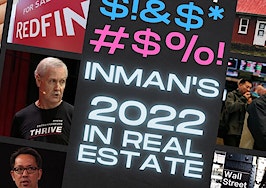New markets require new approaches and tactics. Experts and industry leaders take the stage at Inman Connect New York in January to help navigate the market shift — and prepare for the next one. Meet the moment and join us. Register here
Following a standout year in 2021, the luxury real estate market finally hit a long-awaited blip in 2022 — but not right away.
Through years of a dreadful coronavirus pandemic, luxury clients continued to put their money into real estate as favorable market conditions like record-low interest rates spurred them to buy, while many continued to wonder how long this honeymoon phase of investing cheaply could last. But as much as high-net-worth individuals typically appear to be unaffected by larger market forces, this year ultimately proved otherwise.

Bess Freedman | Brown Harris Stevens
“The first two quarters [of 2022] were like a continuance of 2021,” Bess Freedman, CEO of Brown Harris Stevens, told Inman recently.
“There was still that feeling of FOMO in the air and people were still spending, so the luxury market remained steady and somewhat strong. We saw big purchases in the Hamptons and Palm Beach and in New York City, so that was good. But as we moved into the third and fourth quarters, things have definitely slowed down. It’s not like the brakes are on, but people are trying to sort out what’s going on in the market overall.”
“It’s a more guarded environment overall because of what’s going on,” Freedman added. “You can’t not recognize that we’re in a different economic environment.”
But even amidst that fluid economic environment, a number of luxury companies grew in 2022, undeterred by the year’s challenges. For instance, The Agency and Pacaso had big years for expansion and strategic partnerships. A number of top luxury agents also took the opportunity this year to reset or shift their business in some way. And brokerages embraced the crypto and metaverse movement, bringing the real estate transaction further into the future.
Through the year’s peaks and valleys, the following stories in luxury real estate stood out:
Table of Contents
- The luxury market took a hit
- The Agency grew exponentially
- Reality TV had its moment
- Coastal grandmother, Barbiecore, McBasements and more trends
- Pacaso continued to expand even amid challenges
- A few high-profile agents made major moves
- Brokerages go in on crypto and the metaverse
- Corcoran faces scandal with Global Living franchise
- The end of an era at Hilton & Hyland
The luxury market took a hit
The year started off on a high note, with reports coming in during January of luxury buyers being hit particularly hard by bidding wars the previous month as demand was high and competition fierce.
At that time, luxury clients were also willing to spend some extra cash and leaned into booking longer luxury vacation stays, agents in Northern California told Inman.
But nothing lasts forever, and factors beyond the control of real estate professionals ultimately began to take a toll on the luxury sector. Rising rates and prices, political uncertainty abroad, a chaotic stock market and layoffs at a few major U.S. corporations gave luxury buyers pause starting late in the spring.

Florian Wehde / Unsplash
During the three months ending April 30, luxury sales were down 18 percent year over year, according to Redfin. Then in August, Manhattan saw its worst week of luxury sales since the peak of the pandemic in August 2020. By September, a report from Redfin showed that luxury sales had tanked 28 percent year over year during the three months ending Aug. 31, representing a 10-year low in sales.
Luxury agents told Inman the slowdown was part of a broader movement of normalization in the market. But particularly during this year’s highest points of economic uncertainty and layoffs, luxury buyers took the opportunity to pause and consider their options more carefully.
“You have rates that have ticked up, you have stock market volatility, you have the psychology of people feeling uncertain and guarded versus optimistic, and therefore, I think luxury is, just like everything, certainly being impacted,” Freedman told Inman.
Key stories:
- Bidding wars hit the luxury market hard in December: Redfin
- Pandemic, remote work continues to fuel longer luxury vacation stays
- Manhattan’s luxury market sees worst sales week since Aug. 2020
- Luxury home sales plunge to 10-year low, surpassing COVID levels
The Agency grew exponentially
Luxury boutique brokerage The Agency had been gaining speed over the last couple of years in terms of expansion, but in 2022 it seemed like the company really kicked it into overdrive.
The Agency landed a $35 million funding round from a group of unnamed investors and announced its acquisition of New York-based indie brokerage Triplemint at the beginning of May, helping to solidify its influence on the East Coast as it continued adding more offices in the region throughout the year.

Mauricio Umansky, left, David Walker, top right, and Philip Lang
The brokerage then went on to add a total of 24 new corporate and franchise offices to its ranks over the course of the year across the U.S., the Caribbean, Mexico, Canada and Europe for an average of two office launches per month.
But CEO and founder Mauricio Umansky didn’t stop there — The Agency also established a partnership with luxury fractional homeownership company Sonhaus and launched its own mortgage and other ancillary services. The brokerage then also teamed up with Netflix to create a real estate reality TV show starring some of The Agency’s agents called Buying Beverly Hills.
Key stories:
- The Agency acquires Triplemint, raises $35M
- The Agency expands to include mortgage and other services
- An inside look at ‘Buying Beverly Hills,’ starring The Agency’s top talent
- The Agency partners with luxe ‘innovative’ company Sonhaus
Reality TV had its moment
Speaking of real estate reality TV, there was a lot of it in 2022. In addition to Buying Beverly Hills, Selling the Hamptons made its debut on Discovery+, Selling the OC premiered on Netflix and Million Dollar Listing LA started its 14th season on Bravo at the beginning of December.
There was plenty of laughter, tears, backstabbing and everything in between — all that one might expect of reality TV.
However, one unexpected outcome of the drama on-screen was a bit of real-life friendly drama between Ryan Serhant of SERHANT. and Bess Freedman of Brown Harris Stevens.
The two CEOs publicly debated the merits and drawbacks of reality TV at The Real Deal’s NYC Showcase + Forum as onlookers wondered if the pop culture phenomenon had a place in the industry.

Ryan Serhant and Bess Freedman | AJ Canaria & Mercedes Santiago of MoxiWorks
Freedman argued later to Inman that the superficial representation of the real estate industry has little substance at best and a propensity for objectifying women on screen at worst, calling the oversexualization of women in such shows “a very poor portrayal of what it’s like to be a businesswoman.”
As a self-made man largely via the lens of Million Dollar Listing New York, Serhant, however, argued that the platform has given agents the ability to leverage their fame and translate it into real estate transactions. He also said the television genre has allowed agents to connect to new audiences and stay relevant.
Jason Oppenheim, star of Selling Sunset and Selling the OC and founder of the Oppenheim Group, also later gave Inman his thoughts on the debate, noting he thought there were “points that can be made on both sides,” but that he largely agreed with Serhant, in that reality TV helps make real estate more accessible and has drawn agents to the industry.
Key stories:
- Things just got real: Ryan Serhant, Bess Freedman spar over reality TV
- Real Tea: Meet the cast of Netflix’s ‘Buying Beverly Hills’
- ‘Million Dollar Listing LA’: What to watch for on the ‘most dramatic’ season yet
- Meet all the agents of the ‘Selling Sunset’ spinoff ‘Selling the OC’
- ‘Selling the Hamptons’ stars reveal what you don’t see on reality TV
Coastal grandmother, Barbiecore, McBasements and more trends
Some of the year’s biggest trends may sound like they could be recurring characters on Saturday Night Live, but these design crazes made legit waves this year.
The coastal grandmother lifestyle trend, which is all about channeling the vibes of relaxing by the ocean in clean and crisp linen clothes, permeated into interior design with a desire for expansive farmhouse-style kitchens, plush cozy interiors with neutral, light colors and a move toward minimalism.
Barbiecore came in hot this summer as advertising for the Barbie film with Margot Robbie picked up (set to premiere July 21, 2023) and as the 60-year anniversary of the Barbie Dreamhouse arrived. Bubblegum pinks, cloud-like furniture, florals and vintage finds can help Barbie fans channel the trend in their own homes, not to mention a glam pink vintage artificial tree.

Sandra Gabriel / Unsplash and asbe / Getty Images
Then there’s the McBasement trend that took over the lower levels of the wealthiest homeowners. A lack of land or zoning restrictions didn’t stop luxury homeowners from expanding their home’s square footage as they took to digging out expansive basements tricked out with every luxury imaginable, such as spas and pools, bedrooms suites, wine-tasting rooms, rock-climbing walls and more. Homeowners even learned to evade the gloominess of traditionally dark, cave-like basements with skylights or grand staircases — indoors or outdoors — that can draw the natural light down.
Wellness also continued to be an important theme for luxury homeowners this year, Douglas Elliman’s Fredrik Eklund and John Gomes recently told Business Insider. But homeowners are now demanding more than just the traditional hot tub or home gym, the top agents said — on-call services like spiritual concierges, in-room cryotherapy and IV drips are now also expected.
Key stories:
- What is ‘Barbiecore’? Design trend pretty in pink as ‘Barbie’ flick nears
- Meet the first responder Mattel modeled a Barbie after
- Forget McMansions — these wealthy homeowners dig McBasements
- Millennial art buyers, ‘toe dipping’ and the return of staycations: 8 summer trends you need to know
- 7 features the world’s wealthiest homebuyers can’t live without today
Pacaso continued to expand even amid challenges
After facing backlash in communities around Sonoma and Napa, California, early into its existence as a luxury fractional homeownership company, Pacaso continued to grow in 2022 and develop a number of strategic partnerships.
The company added homes in key locations, such as the Hudson Valley, the Rockies, the Jersey Shore, Cape Cod and more. It now has luxury properties in roughly 40 different markets across the U.S. and Europe.
Pacaso also added a number of new services for its fractional homeowners, including childcare services through UrbanSitter and boutique transportation services through luxury rideshare company Alto and membership-based regional airline Surf Air.

Pacaso
It also made inroads with established real estate companies by forging partnerships with RE/MAX, Engel & Völkers and REALM. The fractional homeownership company also established a sales certification program with a number of agent incentives. The Second Home Specialist Certification teaches agents about selling high-end homes in destination markets and about co-ownership. And at the program’s completion, agents are given exclusive benefits with Pacaso, including a 1 percent commission on every home share resale for life and a no-cost subscription to Access, a service that provides advanced notice of upcoming home shares.
However, like a number of high-profile companies that struggled through the ups and downs of the stock market in 2022, Pacaso cut 30 percent of its staff in October, citing rising rates and home prices as key contributing factors in the decision.
Key stories:
- Pacaso adorns East Coast with new luxury home shares and technology
- Pacaso aims to make co-ownership more familial with UrbanSitter deal
- Boutique transportation services now part of Pacaso owner amenities
- Pacaso, Realm link up to promote luxury co-ownership
- Pacaso, Engel & Völkers partner to formalize co-ownership model
- Pacaso unveils sales certification program loaded with incentives
- Pacaso slashes 30% of workforce, citing rising rates and home prices
A few high-profile agents made major moves
Amid a shifting market, a number of high-profile luxury agents made major moves in 2022, whether that was through switching brokerages or otherwise changing up their business strategies.
The year started off with Eklund, star of Million Dollar Listing for over a decade, announcing that he would be leaving the show. Eklund started on Million Dollar Listing New York in 2010, then regularly made appearances on Million Dollar Listing Los Angeles in 2020 and 2021 as the Eklund Gomes Team expanded to the West Coast. Following his departure, Eklund went on to develop the agent social app REAL with Hong Kong-based real estate entrepreneur Thomas Ma.
In June of this year Maya Vander, who gained fame on The Oppenheim Group’s Selling Sunset Netflix show, left the brokerage where she made her name for Compass. One month earlier, Vander had launched her own team, The Maya Vander Group. She is now working out of Compass’ Coconut Grove office in Miami.
Following a roughly 15-year stint as the top team in Berkshire Hathaway HomeServices’ global network, The Ivan Sher Group, led by Sher, made the bold move to go indie this October. Called “IS LUXURY,” the brokerage became a member of the Forbes Global Properties network. When Sher spoke with Inman about the move, he said that he’d always been “entrepreneurial,” but that this year, “it just became time [to go independent.]”
The big moves continued as the month went on, with legendary California agent Tracy McLaughlin leaving The Agency after roughly three years of affiliation to join Engel & Völkers. In 2021, McLaughlin was the No. 8 agent in California and the No. 24 agent in the U.S. by sales volume, according to RealTrends. With the move, McLaughlin’s daughter, Whitney McLaughlin, also joined Engel & Völkers Aspen as a real estate adviser.

Engel & Völkers and Rich Hay / Unsplash
Two other groups of agents at The Agency also switched up their structure at the end of the year. The long-time Bond Street Partners, a team formed in 2012 by James Harris and David Parnes (featured on Million Dollar Listing LA), joined up with the Grauman Rosenfeld Group, a team led by Jon Grauman (featured on Buying Beverly Hills), Lauren Grauman and Adam Rosenfeld to create Bond Collective. With their combined forces and previous sales figures, the team is on course to become one of the top 10 mega teams in the country.
Then in November, top LA agent Aaron Kirman made waves by leaving Compass to form his own brokerage in partnership with Christie’s International Real Estate. That means that while the Aaron Kirman Group is now the broker of record and broker house, through the partnership, the company has access to Christie’s referral network, platform, technology and other resources. Kirman told Inman at the time that he wanted to branch out on his own because most other companies were either “too big” or “too small” for his team. “I think the market needs a combo like we have,” he said. “I think it was missing it.”
Key stories:
- Fredrik Eklund leaving ‘Million Dollar Listing’
- Fredrik Eklund and Thomas Ma announce new agent social app
- ‘Selling Sunset’ breakout star Maya Vander moves to Compass
- Top Berkshire Hathaway HomeServices team goes indie
- All in family as Tracy McLaughlin and daughter join Engel & Völkers
- Aaron Kirman leaves Compass for Christie’s International
- ‘MDL’ alum and ‘Buying Beverly Hills’ stars form ‘Bond Collective’
Brokerages go in on crypto and the metaverse
On the heels of Mark Zuckerberg’s announcement in late 2021 that the metaverse was on its way, a number of real estate companies leaned into creating their own digital spaces and embracing cryptocurrencies.
In February, Ryan Serhant, founder and CEO of SERHANT., announced the brokerage’s own virtual world called UNIVERS. The virtual world was established as a space where agents and employees can access tools, documents, educational and marketing resources and more within the metaverse. The Agency also recently announced its first metaverse office, based in Decentraland, through the company’s Turks & Caicos franchise office. The metaverse office serves as an extension of The Agency Turks and Caicos’ marketing plan, with clients given access to explore the company’s listings, get exposure to Turks and Caicos and interact with agents virtually, Managing Director Sean O’Neill told Inman.

The Agency Turks and Caicos
Serhant also ended 2021 by stating in an annual letter to clients that he believed half of all home transactions would ultimately be conducted with crypto technology in the not-so-distant future. The Corcoran Group leaned into cryptocurrencies by adding bitcoin prices to its website in a system update in March that also included the addition of 12 new languages to the site.
As crypto continued to become a larger part of the conversation in real estate throughout the year, companies also established programs to educate agents about crypto and the metaverse. Brown Harris Stevens partnered with the newly founded Metaverse Institute to create a series of learning modules on BHS’ One digital hub on the topics of Web3, cryptocurrencies, the metaverse, non-fungible tokens and more. Web3 real estate startup Propy also launched its own educational program for agents on the metaverse in December following its unveiling in September of limited-edition crypto-themed avatars for agents it sold in the form of NFTs.
Key stories:
- It’s Serhant’s UNIVERS.: First look at brokerage’s new virtual world
- The Agency headed to Decentraland with launch of first metaverse office
- Ryan Serhant to clients: Half of all homes will be purchased with crypto
- How do you say ‘Corcoran’ in Italian? Brokerage adds bitcoin prices, 12 new languages to website
- So Meta: Propy offers certification in virtual world real estate
- ‘Proud to be geeky and nerdy,’ BHS and Metaverse Institute partner
Corcoran faces scandal with Global Living franchise
Following an anonymous tip about a number of real estate agents with Corcoran Global Living facing weeks-long delays in getting paid commissions and power outages at their offices as bills went unpaid, Inman uncovered three separate lawsuits issued against the Corcoran affiliate’s CEO Michael Mahon for alleged fraud and breach of contract.
One countersuit to a complaint Mahon filed against Corcoran Group LLC alleging the parent company’s faulty transaction reporting technology cost his firm hundreds of thousands of dollars stated, “This controversy has little to do with the allegations contained in the Complaint — which are a smokescreen. This matter really involves the unlawful (and often clandestine) conduct of [Mahon’s company] ELI Realty and its current management.”

Marian McPherson
A few weeks later, Inman received a copy of an email sent out from Mahon to employees and associates of Corcoran Global Living’s Southern California and Nevada/California Sierra regions stating that Corcoran Group LLC had terminated both regions’ franchise agreements and that all operations would be shut down by the end of 2022.
At its height, Corcoran Global Living was Corcoran Group’s largest affiliate with 2,600 agents across more than 70 offices.
Days later, Corcoran Group confirmed to Inman that all the embattled affiliate’s regional franchise agreements had been terminated (including its Northern California and Ohio regions), but that a new affiliate would rise in its wake. Corcoran Icon Properties launched on Dec. 19, helmed by leadership that was previously affiliated with Global Living’s Northern California region, encompassing 24 offices and over 900 sales associates and staff that had also been affiliated with the shuttered franchise.
In the wake of Corcoran Global Living’s dissembling, reports have surfaced of a number of agent walk-offs to other firms, including Berkshire Hathaway HomeServices Drysdale Properties, First Team/Christie’s International Real Estate, Sierra Sotheby’s International Realty, Las Vegas Sotheby’s International Realty and Cutler Real Estate in Ohio.
Key stories:
- Corcoran Global Living CEO awash in lawsuits amid agent pay delay
- Corcoran Group terminates Global Living SoCal franchise agreements
- Corcoran launches Icon Properties in wake of Global Living demise
The end of an era at Hilton & Hyland
In one of the saddest moments for the industry this year, Jeff Hyland, the iconic co-founder of Hilton & Hyland, passed away in February after a year-long battle with cancer.
A number of Hyland’s peers, colleagues and friends in the Southern California region shared fond memories with Inman of Hyland and spoke of the lasting impact he had on the industry.

Jeff and Lori Hyland | Amy Graves/Getty Images for Magnetic Collective
James Harris, David Parnes and Michelle Ficarra, who at the time were with the team Bond Street Partners (now the Bond Collective), called Hyland one of the last remaining “titans” of the boutique independent brokerage model who never sold out to a larger corporation. Meanwhile, Kofi Nartey of GLOBL Red said Hyland was an inspiration for him to launch his own brokerage, calling his contribution to the boutique brokerage model “unparalleled.”
Nearly one year later in December, Hilton & Hyland announced that Hyland’s wife, the artist Lori Hyland, had taken sole ownership of the brokerage in an agreement made with Rick Hilton, who would retain his title as the brokerage’s co-founder. Hilton simultaneously announced that he would be launching a brokerage in partnership with his son, Barron Hilton, called Hilton & Hilton.













